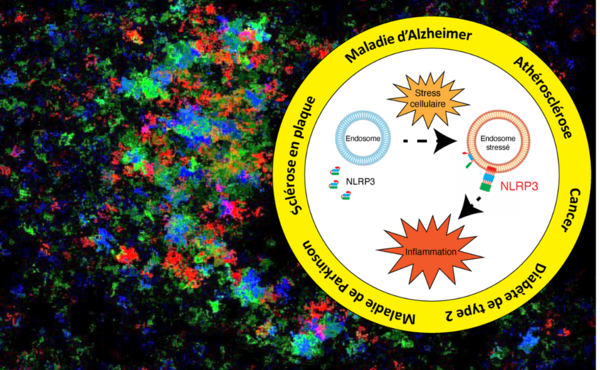Roméo Ricci, ENDOFLAMMASOME project
NLRP3 activation in endosomes: From basic mechanisms to disease
Cells in our body are constantly exposed to environmental stressors. Cells have therefore developed an intricate system of proteins that can detect these insults. Once these proteins get activated by them, they eventually induce an inflammatory response. From an evolutionary perspective, inflammation has a beneficial role as it eliminates these stressors and facilitates the repair of tissue damage caused by them. However, if inflammation persists, it can also have detrimental effects.
Our project, supported by the 'Chaires d’excellence,' centers on investigating a specific protein known as NLRP3, capable of detecting a diverse array of seemingly unrelated environmental stressors. We recently made a discovery that these stressors share a common trait: they all disrupt the composition of a specific cellular compartment known as the endosome. In fact, NLRP3 is recruited to these “stressed” endosomes thereby initiating inflammation. The understanding of this mechanism could potentially explain low-grade inflammation observed in different human diseases including obesity-associated diabetes.
Our discovery created a new research axis in the laboratory that opened fundamentally novel scientific questions. Answering them in a more comprehensive manner constitutes a very ambitious endeavor that requires state-of-the-art experimental tools and collaborations at the international level. A project of this dimension clearly requires substantial funding on a long-term basis. The “Chaire d’excellence” will provide the necessary support that will increase our international visibility at the interface of cell biology and immunology.
*************
Albert WEIXLBAUMER, CoTransSplice Project
Decipher the coupling between mRNA splicing and gene transcription
Albert WEIXLBAUMER is one of the laureates of the ANR Chair d’excellence program. The generous funding will support his research group for 5 years, as they tackle a fundamental question: how is the coordination between transcription and splicing achieved in humans? In gene expression, transcription yields pre-mRNA, a transient DNA copy, which subsequently undergoes splicing to excise non-coding segments, resulting in mature mRNA. The process of splicing is pivotal for human proteomic diversification, as various mature mRNAs can be produced from a single pre-mRNA. Notably, splicing occurs concomitantly with transcription and is regulated by the transcription machinery. Yet, this intricate relationship remains poorly understood and will be the focus of the funded project. Ultimately, this endeavor aims to enhance our comprehension of the interplay between transcription and splicing, elucidating how humans diversify their proteome and how dysregulation of these processes may contribute to disease.


![[Translate to English:] Décrypter le couplage entre l’épissage des ARN messagers et la transcription](/websites/_processed_/8/9/csm_2024-05_Projet_CoTransSplice_WEIXLBAUMER_c8cc38e3f8.jpg)
